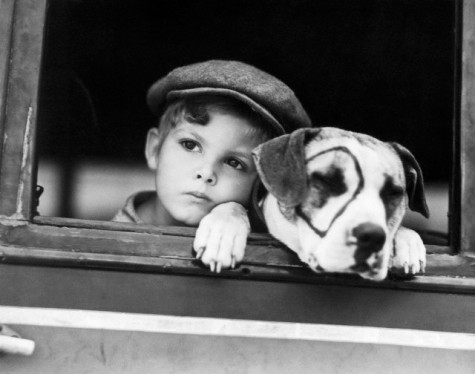
Dickie Moore with Pete the Pup in “Our Gang” in 1930. Moore said he didn’t enjoy the Hal Roach series because he didn’t feel he fit in
Dick Moore was searching for his “Rosebud.”
In “Citizen Kane,” a sled with the word “Rosebud” was the key to Charles Foster Kane’s lost childhood.
For Moore, early memories were a slew of movie scenes with James Cagney, Barbara Stanwyck and Paul Muni. He was the breadwinner for his out of work parents and went to school at a studio with other acting children.
His childhood was far a normal childhood of peanut butter and jelly sandwiches and playing at recess.
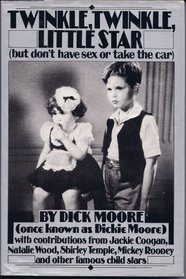 In Dick Moore’s book, “Twinkle, Twinkle, Little Star (but don’t have sex or take the car),” Moore shares his memories of performing as child star Dickie Moore and interviews 31 child actors to see how their experiences compare to his.
In Dick Moore’s book, “Twinkle, Twinkle, Little Star (but don’t have sex or take the car),” Moore shares his memories of performing as child star Dickie Moore and interviews 31 child actors to see how their experiences compare to his.
Some of these actors include Stymie of Our Gang, Roddy McDowall, Jane Powell, Jane Withers, Jackie Coogan, Edith Fellows, Natalie Wood, Jackie Cooper, Shirley Temple, Baby Peggy (Diana Serra Cary) and Peggy Ann Garner.
“All of us shared common lives and times, huge responsibilities and salaries that shriveled fathers’ egos,” Moore wrote
Some children wanted to go into show business, like Jane Withers. Others were pushed by their mothers (or saber-tooth tigers of the Hollywood jungle, according to Diana Cary), like Natalie Wood who sat on a director’s lap and sing him a song while a movie was location in Santa Rosa. And some happened by accident.
Moore was one of those accidents. A friend of a friend of his mother’s was a casting director who happened to stop by the Moore home. The studio pursued Mrs. Moore for Dickie to be in pictures. She said no, but finally gave in since Dickie’s father was out of work.
Dickie was 11 months old in his first film and playing John Barrymore as a baby.
Once Moore started acting, his father had an even more difficult time finding work. Employers assumed he made enough money and other parents brought their children to see Mr. Moore at work, hoping he could put them in films. Mr. Temple had the same problem.
The book explores how each child got into films, their home life, the affect on non-acting siblings and birthday parties.
Most of the young actors’ parties were opportunities for publicity and magazine photographers to put their faces in magazines.
“Everyone was posing. The whole business of publicity made parties seem synthetic. If you have a party, it’s supposed to just be with people,” said actor Gene Reynolds. “But most of our parties were stunt to get pictures in magazines so where is the fun in that?”
Shirley Temple, the first child to carry a full weight picture on her own, would have three birthday parties each year: one with other child actors, one on set with the crew and one with her family.
“The parties were endless…Fox would have one for a large number of people I didn’t know, a lot of children I’d never seen in my life and would never seen again. And I was he hostess. It was kind of strange. I figured it was part of my job.”
Temple was also very isolated, as were many children. Moore’s parents allowed him freedom to play outside while others had no friends.
“Parents often discouraged their children from forming solid friendships because friends might tell each other about a part that was coming up and then, from the parents’ point of view, that wrong child would get the job,” Moore wrote.
Competition was high among child actors: Who could cry the best on cue, lying about ages to be younger and trying to look young, i.e. pigtails, short dresses.
Adult co-stars and their treatment to youngsters are discussed in the book. Marlene Dietrich was warm and friendly in “The Blue Angel,” Franchet Tone taught him how to play chess during “The Bride Wore Red” and Gary Cooper suggested what type of gun Moore should buy.
But Moore’s favorite female adult star was Barbara Stanwyck was Moore’s favorite in “So Big.”
“Affectionate and demonstrative, she was easy to understand. She talked but didn’t fuss,” Moore wrote. “She was a direct and gracious woman, who seemed extremely interested in whatever interested me.”
Unanimously children liked working with Spencer Tracy because he would look right at you during a scene and listen to your lines.
Bobs Watson followed Tracy around during “Boys Town.”
“Often after a scene, he’d reach over and hug me and take me on his lap,” Watson said. “I felt like a little puppy. I would follow him around and stand close, hoping it would call me over and he often would.”
The two most disliked were W.C Fields and Wallace Beery.
“We did four long film together,” Jackie Cooper said about Beery. “They couldn’t find eight guys to carry his casket.”
Margaret O’Brien said he stole her lunch and Jane Powell said he would steal props off the set.
Two children got along with him: Darryl Hickman and Jackie Coogan.
Coogan’s father was a veteran in the business and it seems some of the tougher actors respected him because of this.
Fields notoriously disliked children and was known for getting drunk while filming. But Gloria Jean got along with him, because she tried to look out for him.
While the book tells some humorous and heartwarming stories, there is an underlying sadness. It’s like reading Romeo and Juliet and knowing the lovers die at the end of the play.
You know that for many of the child stars, their career would come to an end.
Children such as Jackie Coogan and Baby Peggy faced financial problems when their family member squandered or stole the millions they had earned for their family.
The biggest fear for a child star is to age, as many faded away when they got older. Moore was in magazines and on ice cream lids (similar to baseball cards) until he had scarlet fever and was away from the screen for a year, taking him back to the bottom.
Baby Peggy felt she was a has-been at five.
Others like Jackie Cooper, Natalie Wood and Roddy McDowall went on to have a successful adult life.
But many child stars, even Jane Withers who loved acting, did not wish for their children to go into the business-they wanted them to have a normal childhood.
“They were wrong,” Roddy McDowall told Moore. “They were wrong to take us children and do that to our lives, to twist our environment in that way and then leave it for us to sort out.”
“Twinkle Twinkle Little Star..” is one of the best classic Hollywood books I have ever read about one of the most complicated and fascinating subjects.
If you can find it for a decent price, I highly suggest it.
This is part of my Children in Film blogathon. Read all of the entries here: https://cometoverhollywood.com/2013/05/24/children-in-films-blogathon-the-contributors/
Check out the Comet Over Hollywood Facebook page for the latest updates or follow on Twitter at @HollywoodComet.

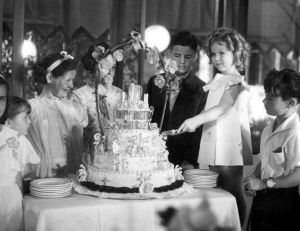
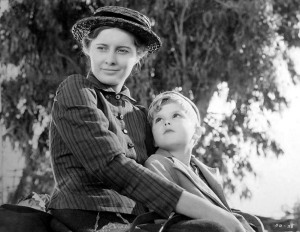
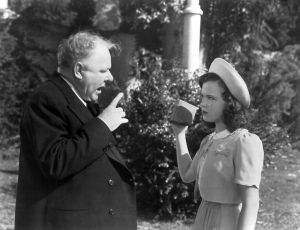
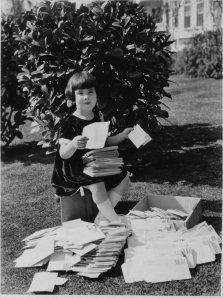
Pingback: Children in Films Blogathon: The Contributors | Comet Over Hollywood
Great piece. There’s always a bittersweet feeling whenever I watch child actors, knowing the odds aren’t in their favor. Watching Three on a Match, I wondered how scenes of drug abuse, kidnapping, and violence affect an actor of that age. Sounds like Moore worked though it though, at least in the respect that he was able to stand back and examine the experience through the eyes of his peers. Thanks for posting!
LikeLike
It is, it’s like knowing a story is going to end badly, but you enjoy reading about the success before the fall.
Just read your Three on a Match and really enjoyed it! And loved the film.
Thank you for reading!
LikeLike
What a wonderful book this may be!
All the stories seem very interesting. Yet, it may be a huge disadvantage to be a child actor, since they have to strggle a lot to prove themselves worthwhile, to show they didn’t loose what made them gracious as children. Ther are many has-been child actors in Brazil, and sometimes we see those questions: where are they now? What are they doing?
Thanks for the information and for hosting this wonderful blogathon!
Kisses!
LikeLike
It is interesting to see how hey end up. How do Brazilian actors compare to American child star?
I’m glad you enjoyed it! Thank you for reading!
LikeLike
I really enjoyed your post. I just put this book on my Half.com wish list, so hopefully I’ll find it at a reasonable price.
LikeLike
When I bought this book (on impulse lol) the cheapest I could find was $30 and it came in excellent shape. I got mine from Abe Books.
Thank you for reading and I’m glad you enjoyed it. It’s a wonderful book with a lot of great insight, but unfortunately alot of heartbreak
LikeLike
Sounds like a wonderful book! It’s nice to know that everyone, young & old, loved Stanwyck and that WC Fields was true to himself at all times! Lots of great stories, but as already mentioned, all tinged with sadness at the exploitation of children and childhoods lost. Great post and thanks ever so much for hosting this very interesting and fun blogathon.
LikeLike
It’s really really great, I highly suggest it.
And I was very happy to hear that Stanwyck is great, it’s always disappointing to find your favorites are not so wonderful.
There were so many anecdotes that I wish I could have summarized more but it would have gotten to be too long of a post.
Thank you for reading and I’m glad you enjoyed your blogathon. I loved your Hayley Mills post so much
LikeLike
Pingback: Three on a Match – 1932 | The Bogie Film Blog
This book sounds quite moving. I liked what he said about Spencer Tracy, and laughed when he talked about Wallace Beery. Beery, apparently, was NOTORIOUS for stealing things from the set then selling them privately.
The statement that stood out the most for me was Roddy McDowall’s, and how he talks about his childhood being taken & twisted, then he was left to sort it out.
Thanks for this thought-provoking post.
LikeLike
It is pretty moving. There were some sad moments that would make me choke up and others I’d grin because it was so heartwarming.
The statement by Roddy was sad but telling. Roddy seemed to be happier and have it better than others, but he was still very lonely which is how he and Jane Powell became friends.
Thank you for reading 🙂
LikeLike
I remember seeing Dickie Moore as the son of Marlene Dietrich and Herbert Marshall in “Blonde Venus” and wondering what it was like for child so young to be in the midst of such beauty and glamour – and, ultimately, artifice. Sounds like his book answers that question. Very enjoyable piece – and a perfect capper for the blogathon.
LikeLike
I wondered the same thing and I wondered how Marlene acted around a child actor. I was pleased to read that she was warm and friendly.
Thank you for reading and I still love and am very jealous of your conversation with Edna Mae.
LikeLike